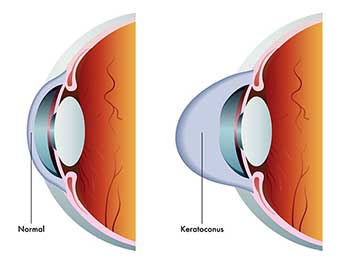Search
Search
Our goal is to provide comprehensive eye care to everyone who comes to see us. One of the common conditions that we can diagnose and manage involves the cornea. As cornea specialists in Arizona, we want to make sure that everyone has optimized cornea function. One of the conditions that might impact the cornea is called keratoconus. These are the important points to know about this condition.
First, it is important to note that keratoconus is a common condition that can impact the cornea. In this condition, the cornea starts to become thin. Over time, it becomes so thin that it starts to protrude from the eye. This leads to a very abnormal shape that makes it almost impossible for the eye to focus light in a proper manner. As a result, people with keratoconus start to have trouble seeing.
The most common age at which keratoconus presents is during the teenage years or early 20s. While the condition likely starts much sooner than this, this is when symptoms start to show up.

This is a condition that is usually found in younger people. In the early stages, people with keratoconus will not show any symptoms at all. By the time people reach their teens or early 20s, the symptoms start to show up. Some of the most common symptoms include:
While keratoconus can present in a number of different ways, these are the most common symptoms.
When someone shows up with symptoms of keratoconus, it is important to make a diagnosis quickly. Usually, patients present with the symptoms above. This prompts the eye doctor to do an in-depth eye exam that measures the curvature of the cornea. This is where the diagnosis of keratoconus comes from. Signs of thinning and stress lines are seen during the exam and lead to the diagnosis.

Once someone has been diagnosed with keratoconus, the treatment process can begin. Usually, this starts with specialized glasses and contacts that have been designed to slow the process. Eventually, this will not be enough to keep keratoconus at bay. Once this point is reached, surgical options are available including corneal cross-linking and even a corneal transplant. If surgical treatment is necessary, Swagel Wootton can refer you to a corneal specialist.
Corneal cross-linking is a minimally invasive outpatient procedure that combines specialty formulated eye drops and UV light to stiffen and strengthen the corneas. This treatment can help prevent the need for a corneal transplant someday. In the most severe cases, a corneal transplant is necessary and generally very successful.
This is a serious condition and it needs to be treated properly to preserve and correct vision. Swagel Wootton’s team of expert eye doctors, including our Keratoconus specialist, is here to help support you every step of the way in your vision journey. Contact us today to schedule an appointment.